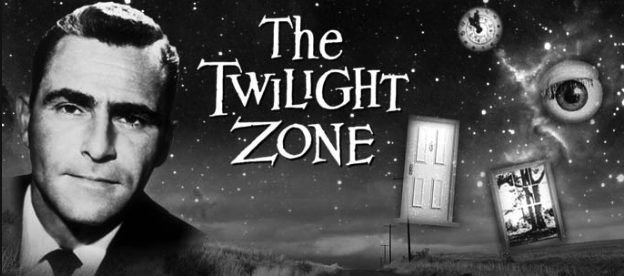I think it’s criminal that we are not permitted to make dramatic note of social evils that exist, of controversial themes as they are inherent in our society. I think it’s ridiculous that drama, which by its very nature should make a comment on those things which affect our daily lives, is in a position, at least in terms of television, of not being able to take that stand. —Rod Serling (1959)
Rod Serling, born Edwin Rodman Serling on December 25, 1924, would become one of America’s most important writers and producers of television dramas and screenplays primarily because of his vocal disapproval of censorship in the media. Before he began to seek new forms of media with minimal censorship, he was a successful writer for Playhouse 90, an American anthology drama. There, he wrote emmy-award winning scripts for “Patterns” (1955), a dramatization about corporate power, and “Requiem for a Heavyweight” (1956), which showed the struggles of a retired boxer in the aftermath of his 17-year career.1 However, it was Serling’s “A Town Has Turned to Dust” that would be his most controversial moment as part of the Playhouse 90 crew and would lead him into his next project as a writer. “A Town Has Turned to Dust” followed the story of Emmett Till, the young black boy brutally murdered in 1955 for allegedly whistling at a white woman in Mississippi. CBS decided to censor Serling’s script by making the black boy that was supposed to represent Till into a Mexican boy; they also made it seem as though it was the boy’s fault by depicting him as “getting out of line.”2 The network’s censorship removed many of the painful truths regarding the prejudices in America during this time. Serling would turn to the avenue of science fiction in order to escape this kind of censorship; in the words of Serling, “You know, you can put these words into the mouth of a Martian and get away with it.” Serling’s desire to get away from censored forms of media led to the creation of The Twilight Zone (1959-1964), a science fiction series that showcased people’s greatest fears ranging from alien invasion, death, ghosts, and even the effects of the Cold War on American society.3

Along with his criticism towards racial prejudice, Serling had his objections to the Cold War. The themes of the Cold War were largely absent from sitcoms and dramas during the 1950s; however, the episodes of The Twilight Zone, titled “The Shelter” (1961) and “Third from the Sun” (1960), discuss the effects of the Cold War head-on.4 In these two episodes, Serling brings forth the fears of the American people that were prevalent during the Cold War era (1945-1991) in terms of the overall anxiety and anticipation for a nuclear holocaust as well as the effects that the arms race had on the American psyche.
“Third from the Sun” deals more directly with the arms race and the creation of the hydrogen bomb. It was believed that the Americans were the only ones in possession of the atomic bomb; however, in 1949, the Soviets tested their first atomic bomb leading Truman to begin the quest for creating a more powerful bomb—the hydrogen bomb.5 Before the creation of this bomb, many people questioned the necessity of it. Would America win the arms race and would that be the end of it? Or would Russia create a hydrogen bomb as well? To address this question with our knowledge now, when the United States created the first hydrogen bomb in 1952, the Soviets followed suit with the creation of their first hydrogen bomb in 1955.6 Now, two nations were in possession of the world’s most powerful bomb. As Harold C. Urey stated, “Suppose that two countries have the hydrogen bomb…I would say that the probability that a war will start is increased if two groups each believe that they can win that war.”7 With the creation of the hydrogen bomb in both the U.S. and Russia, both countries were capable of obliterating the other. This is seen in “Third from the Sun” when Will Sturka, a scientist that works on hydrogen bomb production, learns from a suspicious coworker that the company planned on setting off a bomb in 48 hours. With this information, Sturka and his friend, Jerry Riden, a pilot of an experimental spacecraft, decided that it was time to move to Earth, the third planet from the Sun, in order to save their family from a nuclear holocaust. Hypothetically, we see that in the case of a nuclear holocaust, due to the mass destruction and horrors that a hydrogen bomb would produce, moving to another planet would be the best option. However, how many people have that option? Serling questions the necessity of using a hydrogen bomb because in the end, no one wins and all it brings is devastation and death.8

In relation, “The Shelter” shows the anxiety and hysteria that laid within the minds of the American people, knowing that at any moment, the enemy could drop a bomb on America and everything would change. In this episode, Dr. Stockton’s birthday party was interrupted by a radio announcement that there was a detection of a UFO, most likely missiles, en route to the U.S. and everyone is advised to seek shelter. Out of all the people present at the party, Dr. Stockton was the only one who had a shelter prepared. While everyone frantically ran to their houses to figure out what to do, Dr. Stockton and his family started to collect water, food, and things for entertainment into the shelter. The neighbors began to come back to Dr. Stockton’s house and tried to guilt him into letting them stay in his shelter with his family; however, the shelter could efficiently protect only three people. After the doctor refuses to allow any of the neighbors into his shelter, the neighbors try to break into the shelter in their last attempt to save themselves. At the end of the show, the advisory is called off and the friends of Dr. Stockton are ashamed that they put him and his family’s lives in danger because they were not prepared for a missile attack. Serling is sending a powerful message about the unpleasant aspects of human nature that can occur in life-or-death situations, as well as the importance of being prepared for this worst (even though people did not want to think about it).9

From these two episodes of The Twilight Zone, we see the ugly tendencies of human nature in regards to selfishness during a crisis in order to save one’s self, the unfortunate willingness of countries to bring another country to complete destruction via hydrogen bomb, and the importance of disaster preparedness. If Serling had tried to write these scripts for Playhouse 90, the messages would most likely have been completely distorted by the network’s need to censor material in order to protect their interests. The beauty of The Twilight Zone came from the fact that Serling could deliver powerful, uncensored messages in a half-hour span, delving into people’s worst fears and opening their eyes to the harsh reality that was bestowed upon them.

In 1964, after airing one-hundred-fifty-six episodes, The Twilight Zone was cancelled and Serling took to the lecture circuit where he delivered speeches to crowds in which he was able to speak more freely and openly. Just as Serling showed his disapproval for the Cold War in these two episodes of The Twilight Zone, he often talked about his disapproval for the Vietnam War in his lectures: “America’s destiny…lies on the streets of Newark, Miami, Chicago, Los Angeles and Harlem…not in Saigon. And certainly not at the cost of twenty-thousand dead American boys.” 10 In his lectures, Serling did not have to put these words into the mouth of a martian. Through his lectures, Serling was now able to express the emotions that so many Americans felt during times of war in a more direct way—without the necessity of crafting a masterful thirty-minute, science-fiction episode just to escape the scrutiny of media censorship.
- Encyclopedia Britannica, 2016, s.v. “Rod Serling.” ↵
- Meredith Brenner, “Thirty Minute Reality Check: How The Twilight Zone Reflected American Society in the 1950s,” (Thesis, University of Maryland, College Park, 2004), 1. ↵
- Meredith Brenner, “Thirty Minute Reality Check: How The Twilight Zone Reflected American Society in the 1950s,” (Thesis, University of Maryland, College Park, 2004), 1. ↵
- Heather Lunney, “Exploring the Cold War through The Twilight Zone: Five episodes in a journey to a dimension of sight, sound and mind,” History in the Making Vol. 3, no. 1 (2014): 40. ↵
- Richard Dean Burns and Joseph M. Siracusa, A Global History of the Nuclear Arms Race: Weapons, Strategy, and Politics 2 Volumes: Weapons, Strategy, and Politics (Santa Barbara, CA: Praeger, 2013), 37. ↵
- Richard Dean Burns and Joseph M. Siracusa, A Global History of the Nuclear Arms Race: Weapons, Strategy, and Politics 2 Volumes: Weapons, Strategy, and Politics (Santa Barbara, CA: Praeger, 2013), 34. ↵
- Harold C. Urey, “Should America Build the H-Bomb?,” Bulletin of the Atomic Scientists, March 1, 1950, 73. ↵
- “The Shelter,” The Twilight Zone, directed by Lamont Johnson (Los Angeles: CBS, 1960). ↵
- “The Shelter,” The Twilight Zone, directed by Lamont Johnson (Los Angeles: CBS, 1961). ↵
- Rod Serling (lecture presented at Moorpark College, Moorpark, CA, December 3, 1968). ↵



76 comments
Samantha Ruvalcaba
I’m glad creators like Rod Serling existed at such an early time in entertainment/cinematic history. Serling wanted to shed light on the flaws of society at a time that the American people really deserved honest review/representation. I’m glad to know that The Twilight Zone did in fact run for so long despite the initial reaction by critics to censor controversial content, and that even after the show was cancelled, Serling continued to made sure to speak about issues openly and freely.
Engelbert Madrid
It is very disappointing to know that the American Media, past and present, cancel and hide several shows or reports that only are in opposition of American nationalism. I believe that Sterling’s shows, especially the Twilight Zone and A Town Has Turned To Dust, could have a had a greater impact in America if only the media didn’t cancel the shows before finishing. People like Sterling intend to give the public an idea of the horrible things that America keeps doing without noticing the harm they are doing to themselves.
Lilliana Canales
Fist off, that quote from Rod Sterling was a beautiful introduction. Secondly, for someone such as myself who only enjoyed the Twilight Zone as science fiction, I had no idea that Sterling was trying to oppose things like the cold war through his characters. I also didn’t know that the show was cancelled, I just assumed Sterling was the one who put an end to it. It was very disappointing to read that the American media censored a lot of Sterling’s productions due to his views on society, but then again, it was the 1950’s so that’s expected, but it’s satisfying to know that to get his views across, he came up with a way to say it that wouldn’t be censored. This article kept me reading the whole time and I will now be seeing The Twilight Zone in a new perspective.
Mariah Cavanaugh
What a fantastic well-written article. I have never been a fan of The Twilight Zone, but your article has intrigued me, and I may have to watch a few episodes. The way in which he chose to fight back against censorship was so clever. True artists such as Rod Sterling have a fantastic talent for showing humanity its dark side.
Christopher Hohman
Nice article. Rod Serling was definitely a genius. I have watch many twilight zone episodes and they really are creepy as heck. My favorite was nightmare at 10,000 feet. It must not have been lost on the American people how shockingly relevant these episodes were. But I think they are still relevant today. After all we still have nuclear weapons and the animosity between the US and North Korea, and the US and Russia is certainly unsettling. I like the shelter episode most people today including myself would not even think about preparing for something like a nuclear weapon
Greyson Addicott
I loved the twilight zone as a kid! Admittedly, I had no idea that one man created all of these episodes, and while I was often suspicious about hidden meanings behind the episodes, before reading this article, I had no idea that they were a protest against the cold war between the USSR and the United States! This article had a specific, professional feel to it. I especially loved the ending, in which our hero was finally able to say what he wanted through his own words, and not that of a “martian.”
Valeria Perez
I have never seen the Twilight Zone, but I did like the creativity Serling used to get around censorship. If something important needs to be said people will always find a way to express their point of view. The Twilight Zone and its theme around a not-to-far-away dystopian future and ugliness of human nature reminded me the of Black Mirror and 1984. These are not meant to scare us (maybe just a little) but rather to show us that we need to change.
Max Lerma
The amount of censorship codes that television shows and movies had back then were ridiculous. I have seen The Twilight Zone, but I was never aware of its backstory. Serling was bold to begin his own show and explore topics that would not only be thought provoking, but also at times frightening to the public. It is great to know he stood up for what he believed in and covered topics that he felt it necessary to address.
Anna Guaderrama
Amazing article! Now although I’ve never watched The Twilight Zone, after reading this article it makes me want to go watch it and see what it’s about. I absolutely loved the comment in the beginning because it really gives a good insight into the kind of person he was. I admire his courage to do what he felt was right and go about doing what he wanted to considering he could’ve just easily gone along with the norms of the time and not made his own path.
Saira Castellanos
i think i saw one epsiode of the Twilight Zone and it completely freaked me out, as it is intended to do, and i stopped watching it. This man is a completely legend in my eyes. He pointed out the problems with the world, and sadly those problems are still holding true today. Its funny to me how he was not afraid to call out organizations or people. Anything to get his point across. Great article.